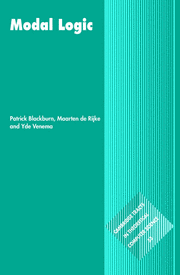Book contents
- Frontmatter
- Dedication
- Contents
- Preface
- 1 Basic Concepts
- 2 Models
- 3 Frames
- 4 Completeness
- 5 Algebras and General Frames
- 6 Computability and Complexity
- 7 Extended Modal Logic
- Appendix A A Logical Toolkit
- Appendix B An Algebraic Toolkit
- Appendix C A Computational Toolkit
- Appendix D A Guide to the Literature
- References
- List of Notation
- Index
7 - Extended Modal Logic
Published online by Cambridge University Press: 05 July 2014
- Frontmatter
- Dedication
- Contents
- Preface
- 1 Basic Concepts
- 2 Models
- 3 Frames
- 4 Completeness
- 5 Algebras and General Frames
- 6 Computability and Complexity
- 7 Extended Modal Logic
- Appendix A A Logical Toolkit
- Appendix B An Algebraic Toolkit
- Appendix C A Computational Toolkit
- Appendix D A Guide to the Literature
- References
- List of Notation
- Index
Summary
As promised in the preface, this chapter is the party at the end of the book. We have chosen six of our favorite topics in extended modal logic, and we are going to tell you a little about them. There is no point in offering detailed advice here: simply read these introductory remarks and the following Chapter Guide and turn to whatever catches your fancy.
Roughly speaking, the chapter works its way from fairly concrete to more abstract. A recurrent theme is the interplay between modal and first-order ideas. We start by introducing a number of important logical modalities (and learn that we have actually been using logical modalities all through the book). We then examine languages containing the since and until operators, and show that first-order expressive completeness can be used to show modal deductive completeness. We then explore two contrasting strategies, namely the strategy underlying hybrid logic (import first-order ideas into modal logic, notably the ability to refer to worlds) and the strategy that leads to the guarded fragment of first-order logic (export the modal locality intuition to classical logic). Following this we discuss multi-dimensional modal logic (in which evaluation is performed at a sequence of states), and see that first-order logic itself can be viewed as modal logic. We conclude by proving a Lindström Theorem for modal logic.
Chapter guide
Section 7.1: Logical Modalities (Basic track). Logical modalities have a fixed interpretation in every model.
- Type
- Chapter
- Information
- Modal Logic , pp. 413 - 484Publisher: Cambridge University PressPrint publication year: 2001



